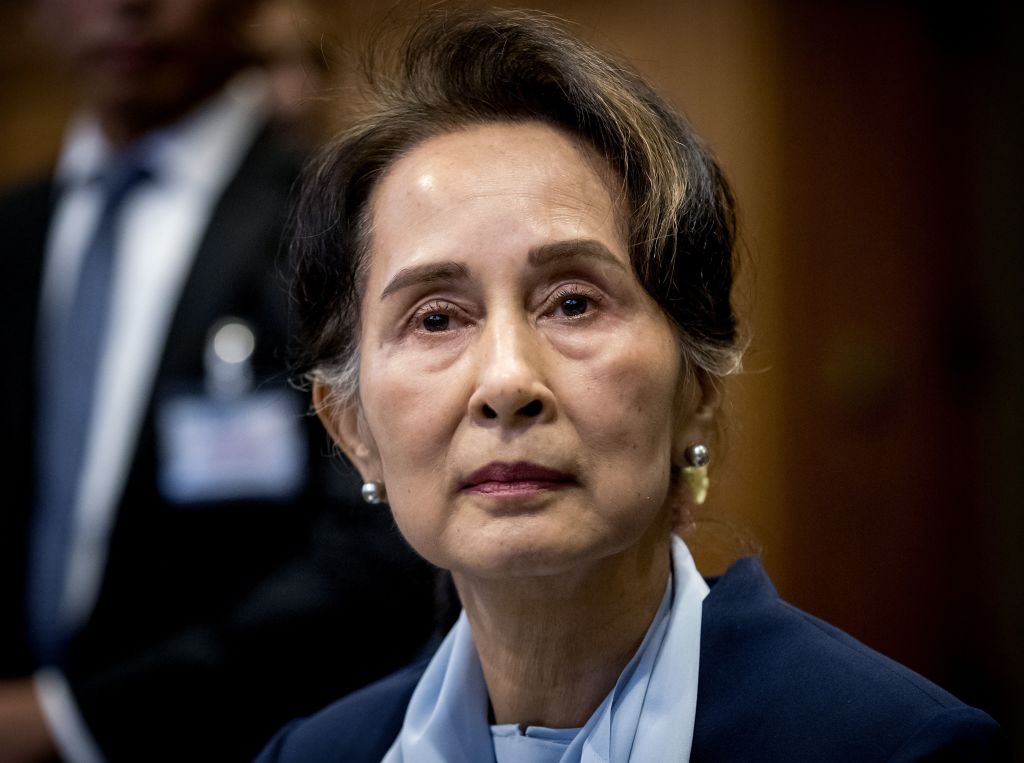
Myanmar’s deposed leader Aung San Suu Kyi was sentenced to six more years in prison on Monday in a judgment that could further anger supporters of the 77-year-old Nobel peace prize laureate.
A special court inside a prison compound in the capital Naypyidaw found her guilty of four corruption charges related to a charity named after her late mother, according to people familiar with the matter who spoke on condition of anonymity because the proceedings aren’t public. It’s the fourth round of criminal verdicts against Suu Kyi since the military seized power in a 2021 coup and brings her total jail term to 17 years, extinguishing any chance of her staging a political comeback while the junta remain in power.
Mandalay Region High Court Judge Myint San ruled that Suu Kyi caused the State to lose more than 24.2 billion kyat ($13 million) by leasing land in Naypyidaw to build the headquarters and related projects of Daw Khin Kyi Foundation, a charity which supported public health and education, at a cheaper price than the rate set by the Internal Revenue Department, according to people familiar with the matter and state media.
Earlier court sentences triggered public anger and intensified armed resistance led by the shadow National Unity Government. Junta troops have killed nearly 2,200 civilians and arrested more than 15,000 others since the coup, according to the Assistance Association for Political Prisoners, which this month said that prisoners in the country are suffering human rights violations.
The junta had accused the deposed leader of misusing public donations to the foundation to build her residence in Naypyidaw and accepting bribes worth $550,0000 from a businessman as a donation to the charity in 2019 and 2020. Suu Kyi denied all allegations and pleaded “not guilty.”
Read More: Can Myanmar’s Democracy Survive Without Aung Sang Suu Kyi?
Three other senior officials, including deposed Naypyidaw mayor Myo Aung and his deputy Ye Min Oo, were sentenced to three years each in prison for the same charges, the person said. Major General Zaw Min Tun, lead spokesman of the ruling State Administration Council, didn’t immediately answer calls seeking comment on the ruling.
Suu Kyi was “very strong and stable” when she heard the verdict and told the court she’ll appeal the decision, the people said. She will also testify in court on Thursday for a charge under the Official Secrets Act which she is defending together with her Australian adviser Sean Turnell.
The former leader faces nine more charges, including violating the colonial-era Official Secrets Act and abuse of power to ensure her political party won the 2020 elections. If she’s found guilty, the remaining charges could add a maximum of 122 years more to her sentence if served consecutively.
Earlier, Suu Kyi was sentenced a total of 11 years in prison by the same court for six charges, including illegally importing and possessing unlicensed walkie-talkies, breaking Covid rules and inciting dissent against the military. She has called the allegations “absurd,” while her supporters say the charges are politically motivated.
The nation’s democracy icon was moved from her residence to an unknown location before her first trial began in camera in a state-owned compound in June 2021. A year later, she was shifted to a military-built solitary confinement unit in Naypyidaw Prison. Journalists are not allowed to witness the court proceedings and Suu Kyi’s lawyers are banned from speaking to the media.
Read More: ‘The World Has Not Forgotten Us.’ A Rohingya Activist Speaks as Myanmar Faces Genocide Case
The U.S. and allies have imposed sanctions on Myanmar military generals and supporters since the coup. Even other member states of the Association of Southeast Asian Nations have been reluctant to cooperate with Myanmar after the junta executed four pro-democracy activists in its first use of capital punishment in over three decades.
Last week, Asean foreign ministers said in a joint statement they were “deeply disappointed” by the limited progress in and lack of commitment of Myanmar authorities to the timely and complete implementation of a five-point consensus agreed earlier by Min Aung Hlaing, the military chief who seized power in the 2021 coup.
More Must-Reads from TIME
- Donald Trump Is TIME's 2024 Person of the Year
- Why We Chose Trump as Person of the Year
- Is Intermittent Fasting Good or Bad for You?
- The 100 Must-Read Books of 2024
- The 20 Best Christmas TV Episodes
- Column: If Optimism Feels Ridiculous Now, Try Hope
- The Future of Climate Action Is Trade Policy
- Merle Bombardieri Is Helping People Make the Baby Decision
Contact us at letters@time.com